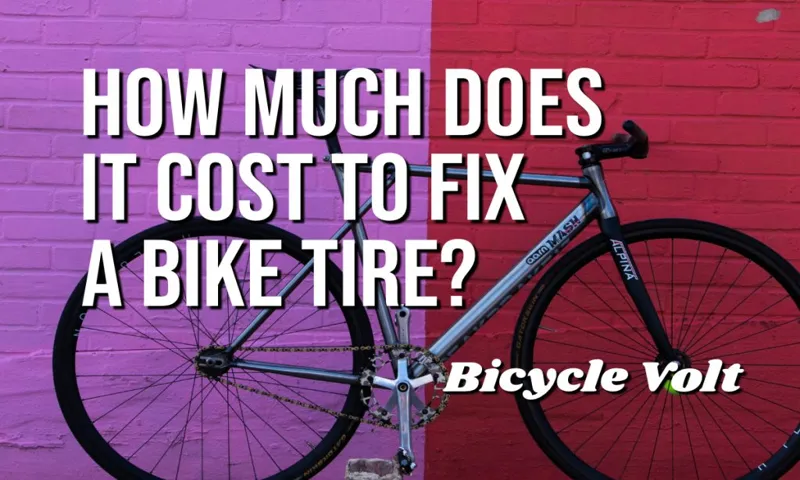As a car owner, one of the most frustrating things that can happen is a flat tire. Not only can it put a damper on your day, but it can also put a dent in your wallet. The cost of tire repair can vary depending on several factors such as the type of tire, the severity of the damage, and where you take your vehicle for repair.
In some cases, a simple patch or plug may do the trick, but in more severe cases, you may need to replace the entire tire. But what is the average cost of tire repair? In this blog, we’ll explore the various factors that contribute to tire repair costs and give you a better understanding of what to expect if you ever find yourself in need of repair. So buckle up, and let’s dive in!
Table of Contents
Factors Affecting Tire Repair Cost
If you’re wondering, “how much is it to fix a tire?” then the answer is not straightforward. Several factors affect the cost of tire repair. Firstly, the type of tire needs to be considered.
The cost to repair a high-performance tire will be higher than a standard one. Secondly, the extent of the damage plays a significant role in determining the repair cost. If a nail or screw punctures the tire in a part that can be repaired easily, then the cost will be much lower than if a large section of the tire has been ripped off.
Furthermore, the age of the tire also plays a role; older tires are more challenging to repair, and therefore the cost is higher. Lastly, the location of the repair is essential. Tire repair costs vary widely across regions, and city centers tend to have higher prices than suburban or remote areas.
Ultimately, the best way to determine the cost of repairing a tire is to take it to a professional tire repair shop and get a quote.
Type of Tire Damage
When it comes to repairing tire damage, there are several factors that can affect the cost of the repair. One of the main factors is the type of tire damage that has occurred. Some common types of tire damage include punctures, sidewall damage, and tread wear.
Punctures can be caused by nails, screws, or other sharp objects on the road. Sidewall damage can be caused by hitting a curb or other object, while tread wear can occur over time as the tire gets older. The severity of the damage and the location of the damage on the tire can also affect the cost of the repair.
The overall cost of the repair will depend on the extent of the damage and the type of repair needed, whether it’s a simple patch or a complete tire replacement. Regardless of the type of damage, it’s important to have your tires inspected and repaired as soon as possible to ensure your safety on the road.

Size of Tire
When it comes to tire repair costs, one of the main factors that affect it is the size of the tire. Larger tires would typically cost more to repair compared to smaller ones due to the amount of material needed and the complexity of the repair. This is especially true for trucks and SUVs with bigger wheels and thicker treads that require more attention and effort to fix.
However, it’s important to note that the degree of damage also plays a significant role in determining the repair cost. In some cases, a small puncture on a large tire could be easily fixed, while a significant one on a small tire might require a full replacement. Thus, when it comes to tire repair costs, the size of the tire is just one factor among many that considers the total cost.
Type of Vehicle
When it comes to tire repair costs, the type of vehicle plays a significant role. Larger and heavier vehicles require stronger and more durable tires, which consequently come at a higher cost. For instance, a full-size SUV will have larger tires that are more expensive to replace than a compact sedan.
Additionally, luxury vehicles may require specialized tires that are exclusive to their make and model, driving up the repair costs even further. It is essential to keep in mind that the larger and heavier the vehicle, the more weight the tire will bear, putting additional stress on the tire’s materials, leading to increased wear and tear. Therefore, maintenance is pivotal in keeping the repair costs under control for larger vehicles.
A routine inspection and prompt action for repairs will help prolong the life of your tires and prevent more substantial expenses in the long run.
Location of Repair Shop
When it comes to tire repair cost, the location of the repair shop can be a significant factor. Typically, larger cities will have higher repair costs due to the increased cost of living and the demand for services. Additionally, shops located in high-end neighborhoods or shopping centers may have higher prices as they cater to a higher-end clientele.
On the other hand, smaller towns or rural areas may have lower repair costs as the cost of living is generally lower. It’s important to note that while location can impact cost, it’s not the only factor. The type and extent of damage to the tire, the make and model of the vehicle, and the type of tire will also play a role in determining the final cost.
When it comes to tire repair, it’s always best to shop around and compare prices to ensure you’re getting the best deal for your needs.
Average Tire Repair Cost
If you’ve ever found yourself with a flat tire or a puncture, you may be wondering how much it’s going to cost to get it fixed. The average tire repair cost can vary depending on a few factors, such as where you live, the type of tire you have, and the extent of the damage. In general, you can expect to pay between $10 and $30 for a simple puncture repair.
However, if the tire has sustained a sidewall or tread damage, or if it has extensive wear and tear, the cost may increase. And if you need a tire replacement, that’s going to cost a lot more. It’s always a good idea to shop around for the best prices and to make sure that you’re getting a high-quality repair or replacement.
Based on Type of Damage
When it comes to tire repair, the cost can vary depending on the type of damage. Generally speaking, the average tire repair cost ranges from $20 to $40. However, it’s important to keep in mind that if the damage is severe, you may need to replace the tire entirely, which can cost significantly more.
If you have a simple puncture or leak, you may be able to have it patched up for a relatively low cost. This type of repair is quick and easy, so you can often wait for your tire to be fixed while you wait. On the other hand, if the damage is more complex, such as a sidewall puncture or a tire that is completely flat, you may need to have the tire replaced entirely.
Additionally, it’s worth noting that some types of tires, such as run-flat tires, may be more expensive to repair. These tires are designed to be able to maintain their shape and continue to be driven on even after a puncture, which means they require unique and often more expensive repairs. Overall, the average tire repair cost is relatively affordable and can save you money in the long run by avoiding the need to purchase a brand new tire.
As always, be sure to get an estimate from a professional mechanic before agreeing to any repairs or replacements to ensure that you’re getting a fair price.
Based on Size of Tire
When it comes to the cost of repairing your tires, the size of your tire tends to be a key factor. Smaller tires, like those found on compact cars or motorcycles, usually cost less to repair than larger tires found on SUVs or trucks. On average, repairing a small tire may cost around $15-$30, while repairing a larger tire could be upwards of $50 or more.
It’s important to keep in mind that these are just rough estimates- the exact cost of repairing your tire will depend on various factors such as the severity of the damage, the age of the tire, and the type of repair needed. In general, though, it’s always a good idea to get your tire repaired as soon as you notice any damage in order to avoid further and more costly repairs down the line.
DIY vs Professional Repair
When it comes to fixing a tire, the decision to go DIY or professional can depend on a variety of factors. First and foremost, the cost can be a major consideration. DIY tire repair kits can range from $5 to $50, while professional repairs can cost anywhere from $20 to $50 per tire.
However, it’s essential to keep in mind that DIY repairs may not always be as effective as professional repairs, and they may even be unsafe in some cases. The quality of the repair can also vary based on the individual’s experience and skill level, which can impact the longevity of the repair. Additionally, some tire damage may require professional repairs due to the complexity of the issue.
Ultimately, the decision to go DIY or professional may depend on the severity and type of tire damage, as well as the individual’s level of experience and comfort with tire repairs. It’s important to consider all of these factors before making a decision and ensuring that safety is always the top priority.
Pros and Cons of DIY
When it comes to repairing something, whether it be a broken gadget or a leaky faucet, the question of whether to attempt a DIY repair or hire a professional can be a tricky one. On the one hand, tackling the job yourself can be a cost-effective solution and can provide a sense of accomplishment. On the other hand, if you lack the necessary skills and knowledge, you could end up making the problem worse or even causing injury to yourself.
One way to approach this decision is to assess the complexity of the task at hand. If it seems relatively straightforward, such as replacing a light switch, a DIY repair may be a viable option. However, for more complex tasks that involve electricity or plumbing, it’s usually best to call in the professionals.
Remember, even if a DIY repair is successful in the short term, it may not be the most cost-effective solution in the long run if further problems arise. In any case, it’s important to weigh the pros and cons before deciding how to address a repair job.
Pros and Cons of Professional Service
Repairing things on our own can be quite tempting, especially when we think about the costs associated with professional services. However, weighing the pros and cons of DIY vs professional repairs is crucial before jumping into a decision. By doing things ourselves, we can cut out the middleman, save money, and feel accomplished.
However, we also risk making mistakes that can lead to costlier repairs in the long run. On the other hand, professional services offer the expertise of trained technicians who can quickly diagnose and fix issues, saving us time and hassle. Nonetheless, they can be costly and might involve a wait time until they can come in.
Ultimately, the choice between DIY vs professional repairs will depend on the complexity of the project, our skills, budget, and time availability. A good rule of thumb is to consider doing what we can, but knowing when to call in the professionals.
Conclusion
In short, the cost of fixing a tire can vary depending on the severity of the damage and the type of tire. But if you’re asking how much it will cost to fix a flat tire, the answer is simple – it’s priceless. Why? Because not only does it save you from potentially dangerous driving conditions, it also saves you from the hassle and stress of being stuck on the side of the road.
So, invest in the safety and convenience of fixing that tire, because ultimately, it’s worth more than any price tag.”
FAQs
What is the average cost of fixing a tire?
The average cost of fixing a tire can vary depending on where you go for service, but it typically ranges from $20 to $50.
Can a flat tire be repaired or does it need to be replaced?
Depending on the severity of the damage, a tire can often be repaired instead of replaced. However, if the damage is too severe or the tire has already been repaired multiple times, it may need to be replaced.
Will my car insurance cover the cost of fixing a flat tire?
Most car insurance policies do not cover the cost of fixing a flat tire. However, if you have roadside assistance as part of your policy, some of the cost may be covered.
How long does it typically take to fix a flat tire?
The time it takes to fix a flat tire can vary depending on the severity of the damage and the availability of replacement parts, but it usually takes around 30 minutes to an hour.
Can I drive on a temporarily repaired tire for an extended period of time?
It is not recommended to drive on a temporarily repaired tire for an extended period of time. The temporary repair is meant to be a short-term solution until the tire can be properly repaired or replaced.
What causes flat tires to begin with?
Flat tires can be caused by a variety of factors, including punctures from nails or other sharp objects, damage to the tire from hitting a curb or pothole, or simply an old or worn-out tire.
How can I prevent getting a flat tire in the future?
To help prevent getting a flat tire, ensure that your tires are properly inflated and regularly check for signs of damage or wear. Avoid driving over potholes or debris in the road, and be mindful of how you park to avoid hitting curbs.


